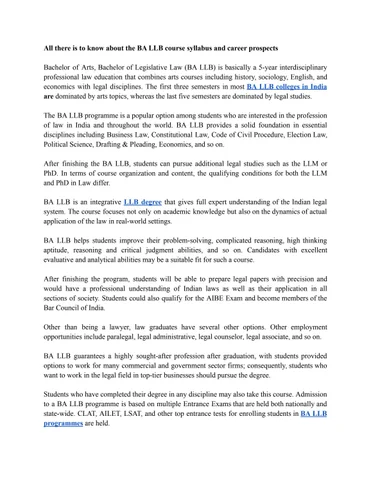The Bachelor of Laws (LLB) is an undergraduate degree in law. This degree is essential for those aspiring to become legal professionals. The LLB program provides comprehensive knowledge of legal principles and practices.
LLB programs are designed to develop critical thinking and analytical skills. These programs also emphasize ethical aspects of the legal profession. An LLB degree opens doors to diverse career opportunities.
A law degree offers a wide range of career opportunities. Graduates can work as lawyers, judges, legal advisors, or consultants. Many also pursue careers in academia, politics, or corporate management.
The legal field is versatile, allowing individuals to specialize in areas such as criminal law, corporate law, or environmental law. The skills acquired through an LLB program are valuable in many sectors.
Essentials For Prospective Law Students
Prospective law students should possess certain key attributes. These include strong communication skills, analytical thinking, and a keen sense of justice. An interest in current affairs and societal issues is also beneficial.
It is important to understand the eligibility criteria for LLB programs. Generally, candidates must have completed their higher secondary education. Some institutions may require entrance exams.
| Essential Attributes | Description |
|---|---|
| Communication Skills | Ability to articulate ideas clearly and effectively. |
| Analytical Thinking | Capacity to analyze complex information and situations. |
| Sense of Justice | Commitment to fairness and ethical practices. |
| Interest in Current Affairs | Awareness of ongoing societal and legal issues. |
Selecting The Right Law School

Choosing the right law school is crucial for your legal career. It influences your learning experience and future job prospects. This section will guide you through important criteria and geographical considerations.
Criteria For Choosing A Law Institution
When selecting a law school, consider these essential criteria:
- Accreditation: Ensure the institution is accredited by the relevant legal education authority.
- Faculty: Look for experienced and qualified professors.
- Course Curriculum: Check if the syllabus covers contemporary legal issues and practical skills.
- Reputation: Research the school’s ranking and alumni success stories.
- Facilities: Assess the library, moot court, and other academic resources.
- Internship Opportunities: Find out if the school has strong industry connections for internships.
- Financial Aid: Investigate scholarships, grants, and other financial aid options.
Geographical Considerations
Location plays a vital role in your law school experience. Consider these factors:
- Proximity to Courts: Being close to courts can provide practical exposure and networking opportunities.
- Local Legal Market: Understand the demand for legal professionals in the area.
- Cost of Living: Evaluate the affordability of living expenses in the city.
- Quality of Life: Consider the climate, culture, and lifestyle of the location.
Choosing the right law school requires careful consideration of many factors. Use this guide to make an informed decision that aligns with your career goals.
LLB Curriculum Breakdown

The LLB Curriculum is designed to provide a comprehensive understanding of law. The course structure includes core legal subjects and elective specializations. This section breaks down the curriculum to give you a clear picture of what to expect.
Core Legal Subjects
Core legal subjects form the backbone of the LLB curriculum. These subjects provide foundational knowledge and skills required in the legal profession.
- Constitutional Law: Understand the structure and functions of government.
- Contract Law: Learn the principles of agreements and obligations.
- Tort Law: Study civil wrongs and remedies.
- Criminal Law: Delve into crimes and punishments.
- Property Law: Explore ownership and property rights.
- Administrative Law: Know the rules governing administrative actions.
Elective Courses And Specializations
Elective courses allow students to specialize in specific areas of interest. These courses provide an opportunity to tailor your education to your career goals.
| Specialization | Description |
|---|---|
| Corporate Law | Focus on business and commercial legal practices. |
| International Law | Study laws governing international relations. |
| Environmental Law | Learn about laws protecting the environment. |
| Human Rights Law | Understand laws related to human rights and equality. |
| Intellectual Property Law | Explore laws protecting inventions, designs, and artistic works. |
Skills Development In Law School
Skills development in law school is crucial for budding lawyers. This period shapes their future careers. Here, students gain essential abilities. These skills are fundamental for success in the legal field. Let’s delve into the key areas of skills development.
Critical Thinking And Analysis
Critical thinking and analysis are core skills in law school. Students learn to evaluate complex legal scenarios. They dissect arguments and identify key issues. This process sharpens their analytical abilities. They become proficient in forming well-reasoned conclusions.
Law students engage in case studies. These real-world examples provide practical experience. They learn to apply legal principles to different situations. This hands-on approach enhances their problem-solving skills. By the end of their course, they can think like seasoned lawyers.
Effective Communication Techniques
Effective communication techniques are vital for lawyers. Law students must convey their ideas clearly. They practice both written and oral communication. This training ensures they can present arguments persuasively. Good communication is essential for client interactions and court presentations.
In law school, students participate in moot court competitions. These simulated court sessions hone their public speaking skills. They learn to articulate their points confidently. Additionally, students write numerous legal documents. This practice enhances their writing proficiency.
| Skill | Description |
|---|---|
| Critical Thinking | Evaluating complex scenarios and forming reasoned conclusions. |
| Case Studies | Applying legal principles to real-world examples. |
| Effective Communication | Conveying ideas clearly in written and oral forms. |
| Moot Court | Simulated court sessions for public speaking practice. |
Law schools also emphasize interpersonal skills. Lawyers must interact with various stakeholders. These include clients, colleagues, and judges. Strong interpersonal skills aid in building professional relationships. They also help in conflict resolution.
Skills development in law school prepares students for the real world. They leave with a robust skill set. This foundation is crucial for their legal careers. Aspiring lawyers become well-rounded professionals.
Internships And Practical Experience
Internships and practical experience are crucial for LLB students. They provide a real-world understanding of legal principles and practices. This section explores the importance of legal internships and how to find opportunities.
Importance Of Legal Internships
Legal internships offer invaluable experience. They help students apply theoretical knowledge in real-world scenarios. Interns work alongside experienced lawyers and understand courtroom procedures.
Internships build professional networks. Students interact with legal professionals, which can lead to job opportunities. Interns also develop critical skills like legal research, drafting, and client interaction.
Practical experience enhances a student’s resume. Law firms prefer hiring candidates with internship experience. It shows they have hands-on knowledge and can handle legal tasks efficiently.
Finding Opportunities
Finding internships can be challenging. Start by checking your law school’s career services. They often have a list of available internships.
Networking is key. Attend legal seminars and workshops. Connect with professionals and express your interest in internships.
Online platforms like LinkedIn and Indeed list numerous internship opportunities. Create a compelling profile and apply to relevant postings.
Consider volunteering at legal aid organizations. These positions may not pay, but they provide valuable experience. They also demonstrate your commitment to social justice.
Stay proactive and persistent. Regularly follow up on your applications. Showing enthusiasm can set you apart from other candidates.
| Source | Description |
|---|---|
| Law School Career Services | Offers a list of internships and career guidance. |
| Networking Events | Connect with professionals and learn about openings. |
| Online Job Portals | Platforms like LinkedIn and Indeed list internships. |
| Legal Aid Organizations | Volunteer positions providing hands-on experience. |
Networking And Mentorship
Networking and mentorship play a vital role in an LLB course. Building connections and receiving guidance can significantly shape your legal career. Engaging with professionals and mentors helps you gain insights and access opportunities.
Building Professional Relationships
Establishing professional relationships is crucial in the legal field. Connecting with peers and professors provides valuable knowledge and advice. Attending legal seminars and workshops can expand your network.
Participate in law school events and join legal societies. This helps you meet like-minded individuals and industry experts. Engaging in discussions and group activities fosters strong connections.
Leveraging Alumni Networks
Alumni networks are a treasure trove of opportunities. Reach out to alumni for career guidance and internship opportunities. Many law schools have dedicated alumni associations.
These associations often host events where you can meet and interact with successful graduates. Alumni can offer insights into various career paths and help you navigate your journey.
| Activity | Benefit |
|---|---|
| Attending seminars | Expands your network |
| Joining legal societies | Connects you with peers and experts |
| Engaging with alumni | Provides career guidance |
Networking and mentorship are key to a successful law career. Building relationships and leveraging alumni networks open doors to numerous opportunities.
Bar Examination And Licensure
The Bar Examination is a crucial step for aspiring lawyers. Passing this exam allows law graduates to practice law. This section covers the preparation and requirements for the bar exam.
Preparing For The Bar Exam
Preparation is key to passing the bar exam. Most students start their preparation months in advance.
- Enroll in a bar review course. These courses provide structured study plans.
- Create a study schedule. Stick to it diligently.
- Practice with previous bar exam questions. This helps you get familiar with the format.
- Join a study group. Discussing topics with peers can enhance understanding.
- Take care of your mental and physical health. Regular breaks and exercise are essential.
State Bar Requirements
State Bar Requirements vary. Each state has its own set of rules and criteria for eligibility.
| State | Requirement |
|---|---|
| California | Must complete a Juris Doctor (JD) degree from an ABA-accredited law school. |
| New York | Requires completion of a JD degree and 50 hours of pro bono work. |
| Texas | Must pass the Multistate Professional Responsibility Examination (MPRE) before sitting for the bar exam. |
Meeting these requirements is essential for eligibility. Check your state’s specific bar exam rules and deadlines.
Career Paths with an LLB
An LLB degree opens many doors in the legal field. Graduates can pursue various career paths that suit their interests and skills. This section explores traditional legal careers and alternative opportunities for LLB holders.
Traditional Legal Careers
Traditional legal careers are the most common paths for LLB graduates. These roles are deeply rooted in the legal system and offer a structured career progression. Below are some of the traditional legal careers:
- Lawyer: Lawyers represent clients in court and provide legal advice. They can specialize in areas like criminal law, corporate law, or family law.
- Judge: Judges preside over court proceedings. They interpret the law, assess evidence, and make rulings.
- Legal Advisor: Legal advisors offer legal counsel to organizations. They help in drafting contracts and ensuring legal compliance.
- Public Prosecutor: Public prosecutors represent the state in criminal cases. They present evidence against the accused in court.
Alternative Opportunities
LLB graduates can also explore non-traditional roles. These roles leverage legal knowledge in unique ways. Here are some alternative opportunities:
- Corporate Consultant: Corporate consultants advise businesses on legal matters. They help companies navigate regulatory requirements.
- Legal Journalist: Legal journalists report on legal issues and court cases. They write articles for newspapers, magazines, or online platforms.
- Compliance Officer: Compliance officers ensure organizations follow laws and regulations. They develop policies to prevent legal issues.
- Academician: Academicians teach law at universities. They also conduct research and publish scholarly articles.
Continuing Education And Specializations
Law graduates have numerous opportunities to enhance their knowledge and skills. Continuing education and specializations can open doors to advanced career paths. Many law professionals pursue higher degrees and certifications to stay competitive.
Pursuing an LLM or other Advanced Degrees
An LLM (Master of Laws) is a popular choice for law graduates. It allows specialization in areas like international law, human rights, or corporate law. An LLM can boost your career and increase your earning potential.
Other advanced degrees include Doctor of Juridical Science (SJD) and Doctor of Philosophy (PhD) in Law. These degrees are ideal for those who aspire to teach or conduct research.
Certifications And Continuing Legal Education
Certifications can enhance your expertise in specific law areas. Cyber law, intellectual property, and environmental law are some popular certifications. They can make you a sought-after expert in your field.
Continuing Legal Education (CLE) is mandatory in many jurisdictions. CLE helps you stay updated with the latest laws and regulations. It ensures you maintain your license to practice law.
Continuing education and specializations help law professionals stay relevant. They provide better career opportunities and higher earning potential. Whether you pursue an LLM or obtain certifications, the benefits are significant.
Adapting To The Evolving Legal Landscape
The legal field changes rapidly. Lawyers must stay adaptable. They need to understand new laws and trends. The LLB course prepares students for this. It teaches them the skills they need to succeed.
Staying Current With Legal Trends
Lawyers must stay updated with new legal trends. This includes understanding changes in laws, regulations, and policies. The LLB course covers recent legal developments. It ensures students are ready for the future.
Students should read legal journals and attend seminars. They should also join legal forums. This helps them stay informed and network with other professionals. Being up-to-date makes them better lawyers.
Embracing Technology In Law
Technology is changing the legal field. Lawyers now use various tools and software. These tools help with research, case management, and communication. The LLB course includes training in legal technology. This prepares students for modern law practice.
Lawyers use tools like legal databases and e-discovery software. They also use online communication tools for virtual meetings. Being tech-savvy is essential in today’s legal environment. It makes work more efficient and effective.
| Technology | Purpose |
|---|---|
| Legal Databases | Research and Case Studies |
| E-Discovery Software | Handling Digital Evidence |
| Virtual Meeting Tools | Remote Client Meetings |
Students should practice using these technologies. They should also learn about cybersecurity. This ensures they can protect client information. Technology in law is not just a trend. It’s a necessity for modern legal practice.
Tips For Academic Success In Law School
Law school can be challenging, but with the right strategies, you can excel. This section provides essential tips for academic success in law school. These tips include effective study strategies and time management techniques. Follow these guidelines to thrive in your legal studies.
Study Strategies
Effective study strategies are key to success in law school. Here are some tips:
- Active Learning: Engage with the material. Don’t just read passively. Take notes, highlight key points, and discuss concepts with classmates.
- Case Briefing: Summarize and analyze cases. This helps you understand the core issues, rulings, and legal principles.
- Practice Exams: Take practice exams under timed conditions. This helps you get used to the exam format and timing.
- Study Groups: Join study groups. Discussing topics with peers can enhance understanding and retention.
- Outlines: Create outlines for each subject. This helps organize your notes and serves as a valuable review tool.
Time Management For Law Students
Managing your time effectively is crucial in law school. Here are some tips:
- Set Goals: Set clear, achievable goals for each study session. This keeps you focused and productive.
- Create a Schedule: Develop a weekly schedule. Allocate specific times for classes, study sessions, and breaks.
- Prioritize Tasks: List tasks by priority. Focus on high-priority assignments and readings first.
- Break Down Assignments: Divide large assignments into smaller tasks. This makes them more manageable and less overwhelming.
- Avoid Procrastination: Start assignments early. Avoid last-minute cramming and stress.
Balancing study with personal life is important. Make time for relaxation and self-care. This ensures you stay healthy and motivated throughout your law school journey.
Life After Law School
Completing an LLB course is a significant milestone. It opens many doors in the legal profession. Graduates face new challenges and opportunities. This phase requiradaptation and perseverance.
Transitioning To Professional Life
Entering the professional world can be daunting. Fresh graduates need to secure internships or junior associate positions. These roles offer practical experience. They also provide exposure to various legal fields.
Networking is crucial. Attend seminars, workshops, and legal conferences. Build connections with seasoned professionals. These relationships can lead to mentorship and job opportunities.
Specialization is another key step. Decide on a specific area of law. It could be criminal, corporate, family, or environmental law. Focus on gaining expertise in your chosen field.
Work-life Balance In The Legal Profession
Maintaining a healthy work-life balance is essential. The legal profession is demanding. Long hours and tight deadlines are common. Prioritize your well-being to avoid burnout.
Time management skills are vital. Plan your day effectively. Allocate time for work, exercise, and relaxation. This balance enhances productivity and mental health.
Support systems are important. Lean on family and friends. Share your experiences and challenges. A strong support network provides emotional stability.
| Aspect | Tips |
|---|---|
| Networking | Attend legal seminars and workshops |
| Specialization | Choose a specific area of law |
| Time Management | Plan your day effectively |
| Support System | Rely on family and friends |
Starting a career in law is rewarding and challenging. Embrace the journey and stay focused on your goals. The skills and experiences gained during this time will shape your future as a legal professional.
Frequently Asked Questions
Which Subject Is Best For LLB Course?
The best subject for an LLB course is law itself. Specializations like criminal law, corporate law, and constitutional law are popular.
Which 5 Year LLB Course Is Best?
National Law School of India University (NLSIU), Bangalore offers the best 5-year LLB course in India.
What Are The Benefits of Studying LLB In India?
Studying LLB in India offers diverse career opportunities, strong legal foundations, affordable education, and exposure to varied legal systems.
What Is The Highest Paying Job After LLB?
Corporate lawyer roles often offer the highest pay after an LLB. Specializing in mergers and acquisitions, intellectual property, or international law can boost earning potential.
Conclusion
Embarking on an LLB Course presents a wide array of career opportunities and numerous benefits. The eligibility criteria and syllabus are thoughtfully structured to provide a comprehensive legal education. Studying law not only opens doors to various legal professions but also enhances critical thinking and analytical skills.
Pursuing an LLB is a pathway to shaping a successful legal career while enabling you to make a positive impact on society.
you May also like this : Haryana Parivar Pehchan Patra: Guide to ID Search & Download



